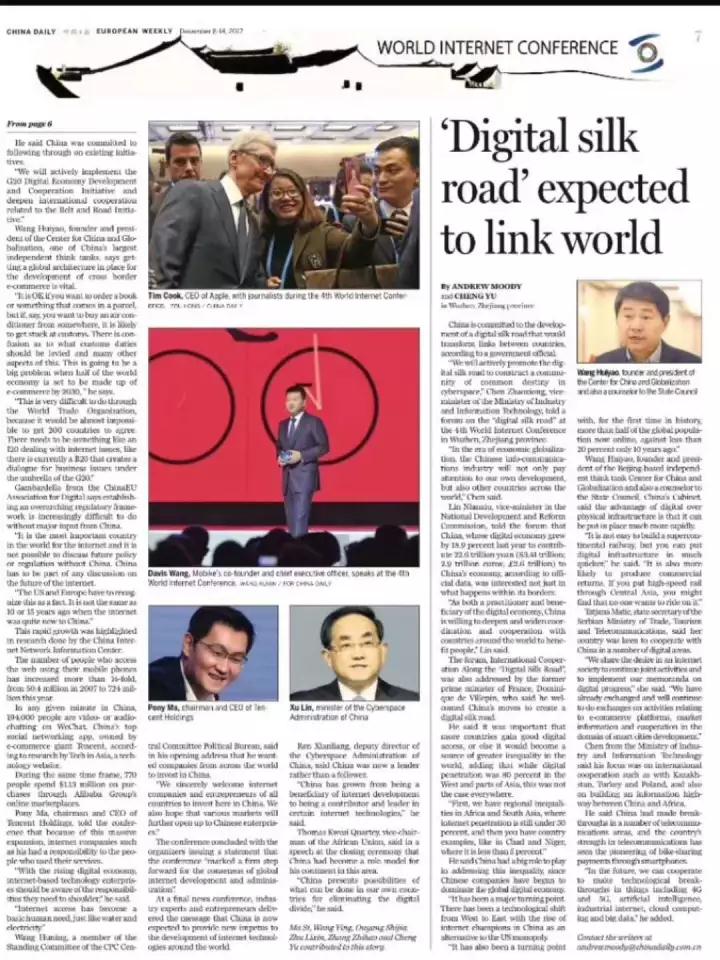【China Daily】’Digital silk road’ expected to link world
December 08 , 2018
“We will actively promote the digital silk road to construct a community of common destiny in cyberspace,” Chen Zhaoxiong, vice-minister of the Ministry of Industry and Information Technology, told a forum on the “digital silk road” at the 4th World Internet Conference in Wuzhen, Zhejiang province.
“In the era of economic globalization, the Chinese info-communications industry will not only pay attention to our own development, but also other countries across the world,” Chen said.
Lin Nianxiu, vice-minister in the National Development and Reform Commission, told the forum that China, whose digital economy grew by 18.9 percent last year to contribute 22.6 trillion yuan ($3.41 trillion; 2.9 trillion euros; £2.6 trillion) to China’s economy, according to official data, was interested not just in what happens within its borders.
“As both a practitioner and beneficiary of the digital economy, China is willing to deepen and widen coordination and cooperation with countries around the world to benefit people,” Lin said.
The forum, International Cooperation Along the “Digital Silk Road”, was also addressed by the former prime minister of France, Dominique de Villepin, who said he welcomed China’s moves to create a digital silk road.
He said it was important that more countries gain good digital access, or else it would become a source of greater inequality in the world, adding that while digital penetration was 80 percent in the West and parts of Asia, this was not the case everywhere.
“First, we have regional inequalities in Africa and South Asia, where internet penetration is still under 30 percent, and then you have country examples, like in Chad and Niger, where it is less than 5 percent.”
He said China had a big role to play in addressing this inequality, since Chinese companies have begun to dominate the global digital economy.
“It has been a major turning point. There has been a technological shift from West to East with the rise of internet champions in China as an alternative to the US monopoly.
“It has also been a turning point with, for the first time in history, more than half of the global population now online, against less than 20 percent only 10 years ago.”
Wang Huiyao, founder and president of the Beijing-based independent think tank Center for China and Globalization(CCG) and also a counselor to the State Council, China’s Cabinet, said the advantage of digital over physical infrastructure is that it can be put in place much more rapidly.
“It is not easy to build a supercontinental railway, but you can put digital infrastructure in much quicker,” he said. “It is also more likely to produce commercial returns. If you put high-speed rail through Central Asia, you might find that no one wants to ride on it.”
Tatjana Matic, state secretary of the Serbian Ministry of Trade, Tourism and Telecommunications, said her country was keen to cooperate with China in a number of digital areas.
“We share the desire in an internet society to continue joint activities and to implement our memoranda on digital progress,” she said. “We have already exchanged and will continue to do exchanges on activities relating to e-commerce platforms, market information and cooperation in the domain of smart cities development.”
Chen from the Ministry of Industry and Information Technology said his focus was on international cooperation such as with Kazakhstan, Turkey and Poland, and also on building an information highway between China and Africa.
He said China had made breakthroughs in a number of telecommunications areas, and the country’s strength in telecommunications has seen the pioneering of bike-sharing payments through smartphones.
“In the future, we can cooperate to make technological breakthroughs in things including 4G and 5G, artificial intelligence, industrial internet, cloud computing and big data,” he added.






